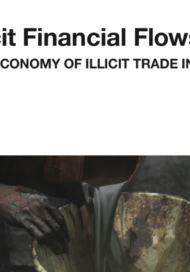Event Details
Posted on 07 Mar 2017
Downstream Oil Theft: Global Modalities, Trends and Remedies.
24th of March 2017
Fuel is vital to human life, and everyone wants a discount. Across the globe, people are willing to break the law in order to pursue that discount.
Off the coast of Malaysia, a smuggling vessel fitted to look like a fishing boat takes on tens of thousands of liters of illicit diesel from a tanker operating as an “open sea fuel station.” Some of the boat’s deckhands are Rohingya refugees from Myanmar caught in the machinery of the region’s human trafficking and slavery networks. The contraband diesel will be offloaded somewhere along the coast of Thailand and distributed through a thriving black market; some of the resulting profits might find their way back to syndicate bosses in Malaysia’s Klang Valley, line the pockets of business tycoons in Bangkok, or finance an attack on civilian targets by insurgents in the southern provinces of Thailand.
While this scenario is only hypothetical, it is entirely plausible, illustrative of everyday realities in the region, and indicative of the way in which downstream oil theft connects with other transnational criminal activities. In January, the Atlantic Council released Downstream Oil Theft: Global Modalities, Trends and Remedies – the first major report on the global problem of downstream oil theft. This month, it is releasing a follow-up report on the “Implications and Next Steps,” serving to focus on both why stakeholders must take action on this issue and what they can realistically do to confront it. Led by Dr. Ian Ralby and his team at I.R. Consilium, the study makes the case that downstream oil theft is one of the most profitable criminal enterprises in the world and is often used to help sustain other forms of organized transnational crime.
In Mexico, the violent Zetas cartel controls about 40% of a billion-dollar black market in illicit fuel. Former rebels from Sudan and the DRC have re-established themselves as fuel smugglers—often bringing their product into Uganda, where a syndicate known as the “Opec Boys” has for years filled supply gaps in underserved regions. Illicit financial flows from oil theft in West Africa have been laundered through European financial systems to end up in Lebanon and Syria. Oil stolen in Nigeria has been blended with Ghanaian oil at a Ghanaian offshore facility before being refined in Morocco for sale in Europe and beyond. Libyan militias have reaped enormous profits from trafficking in both humans and fuel, largely to the European Union. Within the EU, recent law enforcement operations have broken up downstream smuggling and fraud rings worth many millions of euros. One study found that in 2014-2015, chartered oil shipments out of the Turkish port of Ceyhan closely tracked the activities of ISIS around oilfields in Iraq and Syria—and that was only a portion of the estimated 2.7 million tons of fuel smuggled into Turkey each year. And coincidentally, just days after the Atlantic Council report was released in January, the Niger Delta Avengers, whose 2016 campaign of sabotage crippled Nigeria’s oil industry, announced an end to their five-month unilateral ceasefire and the resumption of hostile operations.
While these realities are alarming, they offer only a glimpse into the world’s downstream hydrocarbons crime. As the forthcoming report, Implications and Next Steps, indicates, the first report provides a starting point and helpful foundation for further work. Its ten case studies point to the need for considerably more investigation into how countries, regions, and global markets suffer from the destabilizing effects of fuel theft. More data, especially on the supply chains that shape transnational hydrocarbons crime, need to be collected and sifted. And key stakeholders must come together and form effective near- and long-term strategies to mitigate what we now understand is a serious global issue. There is a great deal of work to do, but the security, stability, and prosperity of both states and regions depend on it.
This report, Downstream Oil Theft: Global Modalities, Trends and Remedies, by Ian Ralby for the Atlantic Council, is the first major study of refined oil theft, presenting ten case studies from around the globe. It examines the forms of hydrocarbon crime, who benefits, who suffers and how much is being lost to governments in the process. The report constitutes the first step to effectively addressing this pervasive, yet under-recognised threat to global security, stability and prosperity.
Chaired by the Global Initiative, the intense discussion featured the report’s author Dr. Ian Ralby, Report author, Founder and CEO, I.R. Consilium.





